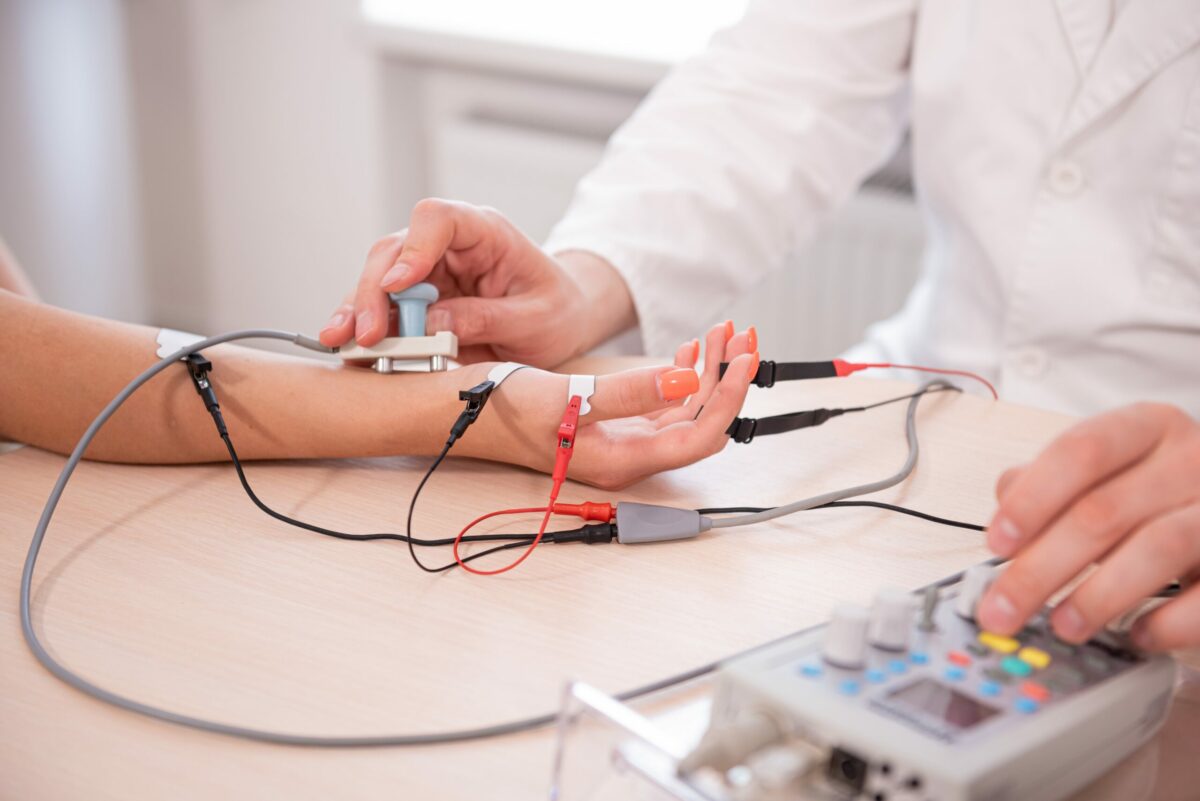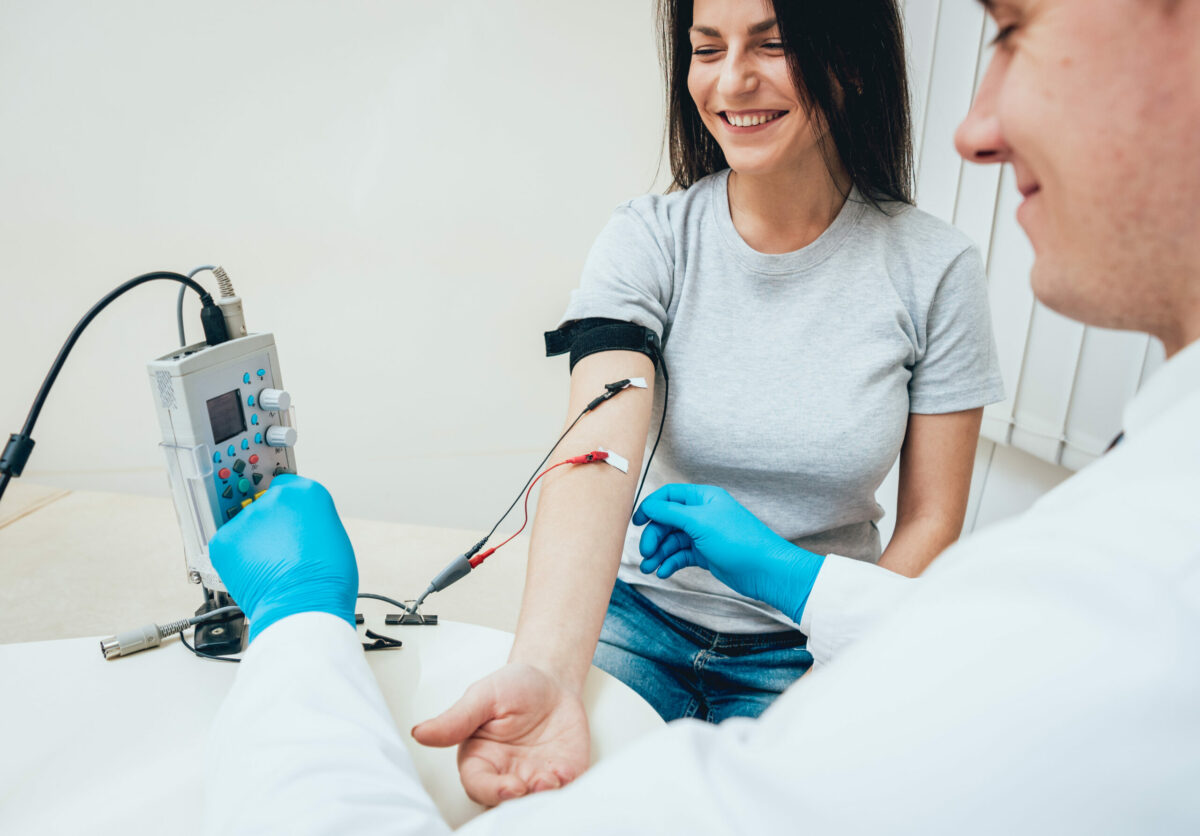
Did you know that an average of 600 EMG studies are performed every year? This diagnostic procedure is commonly used to help diagnose nerve and muscle conditions and is often a vital part of a patient’s treatment plan. However, many people are fearful of EMG tests and wonder whether EMG tests are painful or not.
 What Is an EMG Test?
What Is an EMG Test?
You may have heard of an EMG test before, but you might wonder what does EMG stand for, and what exactly is an EMG test? EMG stands for Electromyography, a diagnostic test used to assess the functionality of muscles and nerves in the human body. Typically performed by a neurologist or a physiatrist, an EMG test measures the electrical activity of muscles and nerves in different body parts. This test is recommended when a patient is experiencing muscle weakness, pain, numbness, or tingling in the extremities.
The EMG consists of the needle EMG and the nerve conduction study. The needle EMG assesses the electrical activity of muscles, while the nerve conduction study measures the speed and strength of electrical signals that travel through a specific nerve. Both tests comprehensively picture the patient’s nerve and muscle function.
What Is the Difference Between EMG and NCV?
EMG and NCV (Nerve Conduction Velocity) are two diagnostic tests often performed to assess nerve and muscle function. Although the EMG, NCV tests are often performed as one test, it is important to understand their differences.
EMG measures the electrical activity of muscles, while NCV measures the speed and strength of electrical signals that travel through a specific nerve. Both tests detect conditions that affect the functioning of muscles and nerves.
The results of the EMG test can help determine whether a muscle or a nerve problem causes muscle weakness or pain. Tiny, fine needles are inserted into the muscle being tested. The electrical activity of the muscle is then measured when the muscle is at rest and contracted.
In contrast, the NCV test uses mild electrical shocks to measure the speed and force of the signals sent through a nerve. The results of the test help determine whether a nerve is damaged or not.
The key difference between EMG and NCV is that an EMG tests the electrical activity in muscles, while NCV tests the electrical signals transmitted through a particular nerve. Although they are often performed together, the results from both tests are used to thoroughly assess muscle and nerve function, which can lead to appropriate treatment plans for the patient.
What Does an EMG Test Look For?
The EMG test is essential for diagnosing and monitoring various conditions affecting muscle and nerve function. An EMG nerve conduction study looks for:
- Muscle weakness: An EMG test can determine the extent of muscle weakness in a particular area and reveal whether the problem is due to nerve or muscle tissue.
- Muscle activity: The electrical activity of muscles can be analyzed using EMG to identify abnormal patterns, spasms, or other abnormal activity.
- Nerve function: The nerve function in the affected area can also be evaluated using EMG to determine if there is any problem with how the nerves communicate with the muscles.
- Pinched nerves: The test can identify whether certain nerves are involved or “pinched” in areas such as carpal tunnel syndrome.
- Damage or disease: EMG can help in diagnosing various conditions that affect muscles and nerves, including amyotrophic lateral sclerosis (ALS), muscular dystrophy, and carpal tunnel syndrome.
Whether identifying weaknesses or pinpointing the cause of muscle spasms, an EMG is essential to help diagnose various medical conditions.
How Long Does EMG Take?
The test duration depends on the number of areas being tested and the complexity of the patient’s symptoms. Generally, EMG tests usually take around 30 minutes to an hour to complete. In some cases, multiple sessions may be required to evaluate all areas of concern.
Is an EMG Test Painful?
The procedure is relatively painless; however, some patients may experience mild discomfort or a sensation similar to a small pinch when the needle is inserted into the muscle. Rarely, patients may also experience some soreness or bruising after the procedure.
What Are Normal vs. Abnormal EMG Test Results?
Normal EMG test results show that muscle and nerve function is normal. This means that the electrical activity in the muscles is within the normal range, and the nerves are functioning as they should.
Abnormal EMG readings can vary and may indicate signs of muscle or nerve damage,myopathy, peripheral neuropathy, muscular dystrophy, or other conditions. In such cases where the tests are conclusive, an individual’s physician can make an accurate diagnosis and recommend treatment options.
If you are experiencing muscle weakness, pain, numbness, or tingling in the extremities, we encourage you to schedule an appointment with one of EmergeOrtho—Triangle Region’s experts or call us anytime at (919) 220-5255.







